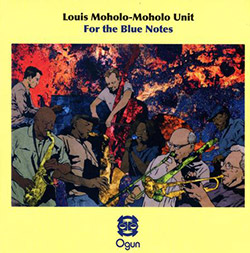
In his 75th year, approaching the tenth anniversary of his move back to his native South Africa, there are no signs of drummer Louis Moholo-Moholo winding down or resting on his laurels. As he makes regular working visits back to London and elsewhere, he remains as energetic as ever and continues to push at the boundaries. So, it seems fitting that this live album was recorded not in South Africa or London but in Milan, Italy, and that it features a new grouping, an extended eight-member version of his well-established Louis Moholo-Moholo Unit, including bassist John Edwards, pianist Alex Hawkins, saxophonists Jason Yarde and Ntshuks Bonga, trumpeter Henry Lowther, trombonist Alan Tomlinson and vocalist Francine Luce. As that line-up suggests, this Unit packs a powerful punch, especially when egged on by an enthusiastic audience.
The title For the Blue Notes is a poignant one, recalling such past Ogun albums as Blue Notes for Mongezi and Blue Notes for Johnny, released to mark the untimely deaths of members of the legendary group, until the 1990 deaths of Chris McGregor and Dudu Pukwana left Moholo-Moholo as the sole surviving member. The Blue Notes' legacy was recognised in the compositions chosen for this concert, including McGregor's dramatic "Ismite is Right", Pukwana's haunting "B My Dear", Mongezi Feza's anthem "You Ain't Gonna Know Me 'Cos You Think You Know Me" and Johnny Dyani's "Ithi Gui" alongside pieces by members of the ensemble. One fault of the album is that three of its last four tracks are dominated by extended and repeated announcements of the personnel, at the expense of the music, with the Dyani piece being particularly affected. Sometimes, once is more than enough!
Otherwise, this album is a joy from start to finish. Covering an impressive range of moods and emotions, it owes debts to much South African jazz in addition to that of its dedicatees. Right from the subdued, mournful opening notes of "Lost Opportunities", composed by the late, lamented bassist and Ogun founder Harry Miller, through to the climax of Yarde's barnstorming "The Tag", the listener is guaranteed a rollercoaster ride built around tight ensemble work, driven by a close-knit rhythm section, haunting ethereal vocals and a procession of pithily economical solos. While it is tempting to single out individuals for praise, that would be unjust; this is a hugely-enjoyable collective triumph. An album so replete with historical connotations is a great way for the Ogun label — in which Moholo-Moholo has played a key role — to have marked its fortieth anniversary. Bravo to all concerned.
Comments and Feedback:
|



